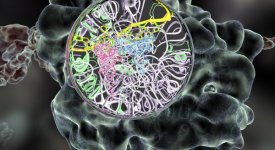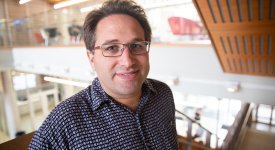
Alex Huth (left), assistant professor of Neuroscience and Computer Science at the University of Texas at Austin. Shailee Jain (right), a Computer Science PhD student at the Huth Lab.


A merged multi-scale structurally valid visualization of the ribosome; the green volume occupying model and the tertiary and secondary structural model is obtained from reconstructed single particle cryo-electron microscopy, while the atomic-resolution structures is from X-ray crystallography resolved models.









